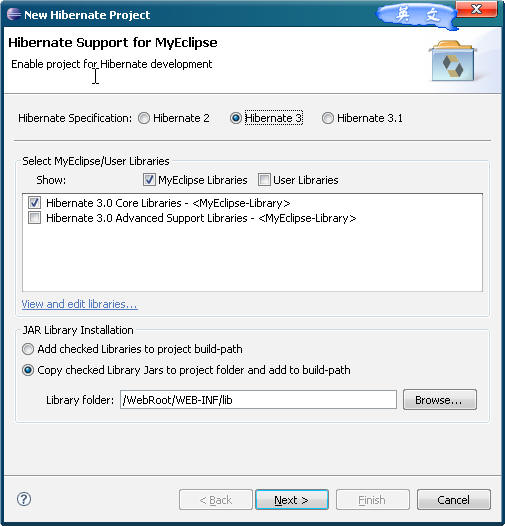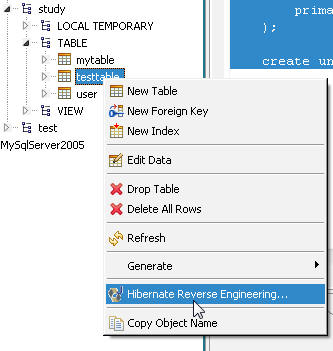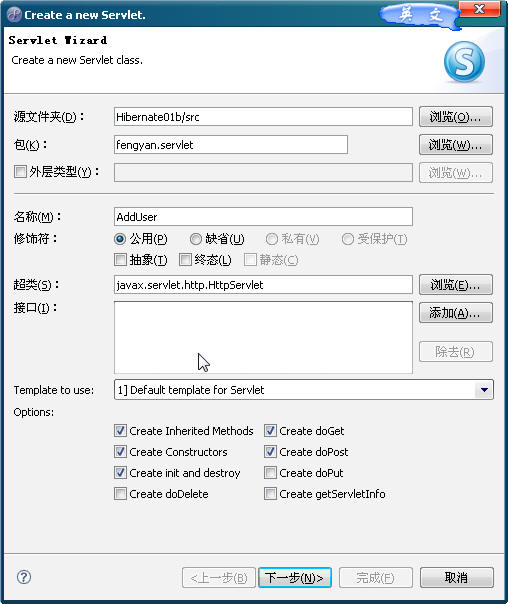Hibernate 初识(补充)
上一篇主要是写了手动写Hibernate , 这一篇加点补充,主要是关于使用Eclipse自动 生成,好了,进入正题:
Step1:首先我们新建一个WebProject!
Step2:在src下新建一个包我取名为 fengyan.hibernate,用于存放Hibernate的配置文件
Step3:现在用MyEclipse添加Hibernate,选中fengyan.hibernate包,单击MyEclipse---->add hibernate capabilities,具体看下图



生成Session工厂类!方便我们取得会话

Step4:单击“完成”后,我们在接着出现的Hibernate.ctg.xml配置文件的视图添加一个properties属性,如下图
具体意思是Hibernate 在运行时可以在控制台输出执行的SQL语句,方便 我们监视!
Step5:我们切换到MyEclipse Database explorer,数据库视图,因为昨天安装了MySQL,所以我配置了MySQL的连接 ,我们在study数据库下新建立一张测试表testTable,
DDL语句如下:
 create table `study`.`testtable`(
create table `study`.`testtable`( `id` int not null auto_increment,--ID 自增加 在SqlServer为 Identity(1,1)
`id` int not null auto_increment,--ID 自增加 在SqlServer为 Identity(1,1) `username` varchar(20),
`username` varchar(20), primary key (`id`)
primary key (`id`) );
); create unique index `PRIMARY` on `study`.`testtable`(`id`);
create unique index `PRIMARY` on `study`.`testtable`(`id`);
Step6:我们选中刚刚新建的表,如下:

创建映射配置信息文件,以及数据Bean对象 Java Data Object
指定主键类型
在 Java src folder 我们选择刚刚新建的包 fengyan.beans,它这时会自动给我们由表生成对应的Beans以及映射信息XML文件
单击下一步 以及完成即可!我们现在看看在我们的beans包下有什么东东,多了名为Testtable.java类,这个就是MyEclipse为我们自动根据Testtable表生成的Bean.看看里面的内容
 package fengyan.beans;
package fengyan.beans;

 public class Testtable implements java.io.Serializable {
public class Testtable implements java.io.Serializable { //继承Serializable接口,序列化,可以排序
//继承Serializable接口,序列化,可以排序

 private Integer id;
private Integer id; private String username;
private String username;

 public Testtable() {
public Testtable() { }
} 
 //看见了,很智能的给我们生成了一个参数的构造函数
//看见了,很智能的给我们生成了一个参数的构造函数 //因为ID为自动递增的主键,所以这里的参数为username
//因为ID为自动递增的主键,所以这里的参数为username public Testtable(String username) {
public Testtable(String username) { this.username = username;
this.username = username; }
}

 public Integer getId() {
public Integer getId() { return this.id;
return this.id; }
}
 public void setId(Integer id) {
public void setId(Integer id) { this.id = id;
this.id = id; }
}
 public String getUsername() {
public String getUsername() { return this.username;
return this.username; }
}
 public void setUsername(String username) {
public void setUsername(String username) { this.username = username;
this.username = username; }
}
 }
}

思考:那这个Bean如何与我们的表关联呢,接着在fengyan.beans包下我们还发现生成了Testtable.hbm.xml 代码如下:
 <?xml version="1.0" encoding="utf-8"?>
<?xml version="1.0" encoding="utf-8"?> <!DOCTYPE hibernate-mapping PUBLIC "-//Hibernate/Hibernate Mapping DTD 3.0//EN"
<!DOCTYPE hibernate-mapping PUBLIC "-//Hibernate/Hibernate Mapping DTD 3.0//EN" "http://hibernate.sourceforge.net/hibernate-mapping-3.0.dtd">
"http://hibernate.sourceforge.net/hibernate-mapping-3.0.dtd"> <!--
<!--  Mapping file autogenerated by MyEclipse - Hibernate Tools
Mapping file autogenerated by MyEclipse - Hibernate Tools -->
--> <hibernate-mapping>
<hibernate-mapping> <!-- Bean的全名 映射的表名 数据库名,因为我们在Hibernate.cfg.xml中配置了数据库,所以这里的catalog要删除 -->
<!-- Bean的全名 映射的表名 数据库名,因为我们在Hibernate.cfg.xml中配置了数据库,所以这里的catalog要删除 -->  <class name="fengyan.beans.Testtable" table="testtable" catalog="study">
<class name="fengyan.beans.Testtable" table="testtable" catalog="study"> <!-- 主键用<id>, -->
<!-- 主键用<id>, --> <id name="id" type="java.lang.Integer">
<id name="id" type="java.lang.Integer"> <column name="id" /><!-- 对应表中的字段名 -->
<column name="id" /><!-- 对应表中的字段名 --> <generator class="native" /><!-- 主键类型native支持自动增长方式 -->
<generator class="native" /><!-- 主键类型native支持自动增长方式 --> </id>
</id> <!-- 一般的属性用<property> -->
<!-- 一般的属性用<property> --> <property name="username" type="java.lang.String">
<property name="username" type="java.lang.String"> <column name="username" length="20" />
<column name="username" length="20" /> </property>
</property> </class>
</class> </hibernate-mapping>
</hibernate-mapping>Step7:我们新加一个DAOs(dataAccessObject)包,并在其中添加一个TesttableDAO.java,负责对Bean的操作,代码如下:
 package fengyan.DAOS;
package fengyan.DAOS;
 import org.hibernate.Session;
import org.hibernate.Session;
 import fengyan.beans.Testtable;
import fengyan.beans.Testtable; import fengyan.hibernate.HibernateSessionFactory;
import fengyan.hibernate.HibernateSessionFactory;
 public class TesttableDAO {
public class TesttableDAO { public void addTesttable(Testtable user)
public void addTesttable(Testtable user) {
{ //创建连接
//创建连接 Session session = HibernateSessionFactory.getSession();
Session session = HibernateSessionFactory.getSession(); //事物
//事物 Transaction tx = session.beginTransaction();
Transaction tx = session.beginTransaction(); //操作
//操作 session.save(user);
session.save(user); //提交事物
//提交事物 tx.commit();
tx.commit(); //关闭会话
//关闭会话 session.close();
session.close(); }
}
 }
}

Step7:接下来建立一个Servlet~如下图:
其中代码:
 public void doPost(HttpServletRequest request, HttpServletResponse response)
public void doPost(HttpServletRequest request, HttpServletResponse response) throws ServletException, IOException {
throws ServletException, IOException {
 response.setContentType("text/html");
response.setContentType("text/html"); request.setCharacterEncoding("GBK");//解决接收中文
request.setCharacterEncoding("GBK");//解决接收中文
 //接收视图中的参数
//接收视图中的参数 String username = request.getParameter("username");
String username = request.getParameter("username"); 
 //声明Bean及操作对象
//声明Bean及操作对象 Testtable user = new Testtable();
Testtable user = new Testtable(); TesttableDAO userdao = new TesttableDAO();
TesttableDAO userdao = new TesttableDAO();
 //执行业务
//执行业务 if(username != null && !username.equals(""))
if(username != null && !username.equals("")) {
{ System.out.print(username);
System.out.print(username); user.setUsername(username);
user.setUsername(username); userdao.addTesttable(user);
userdao.addTesttable(user); }
} else
else {
{ response.sendRedirect("/Hibernate01b/adduser.jsp");
response.sendRedirect("/Hibernate01b/adduser.jsp"); }
} }
}

Step8:接下来写一个东西来测试下!新建立一个adduser.jsp文件
 <%@ page language="java" pageEncoding="GBK"%>
<%@ page language="java" pageEncoding="GBK"%> <%
<% String path = request.getContextPath();
String path = request.getContextPath(); String basePath = request.getScheme()+"://"+request.getServerName()+":"+request.getServerPort()+path+"/";
String basePath = request.getScheme()+"://"+request.getServerName()+":"+request.getServerPort()+path+"/"; %>
%>
 <!DOCTYPE HTML PUBLIC "-//W3C//DTD HTML 4.01 Transitional//EN">
<!DOCTYPE HTML PUBLIC "-//W3C//DTD HTML 4.01 Transitional//EN"> <html>
<html> <head>
<head> <base href="<%=basePath%>">
<base href="<%=basePath%>">  <title>My JSP 'adduser.jsp' starting page</title>
<title>My JSP 'adduser.jsp' starting page</title>  </head>
</head>  <body>
<body> <%=basePath %><BR>
<%=basePath %><BR> <form action="<%=basePath %>servlet/AddUser" method="post">
<form action="<%=basePath %>servlet/AddUser" method="post"> 用户名:<input type=text name="username"/>
用户名:<input type=text name="username"/> <input type=submit>
<input type=submit>
 </form><br>
</form><br> </body>
</body> </html>
</html> 另外将Hibernate及Web.xml文件代码贴下:
hibernate.cfg.xml
 <?xml version='1.0' encoding='UTF-8'?>
<?xml version='1.0' encoding='UTF-8'?> <!DOCTYPE hibernate-configuration PUBLIC
<!DOCTYPE hibernate-configuration PUBLIC "-//Hibernate/Hibernate Configuration DTD 3.0//EN"
"-//Hibernate/Hibernate Configuration DTD 3.0//EN" "http://hibernate.sourceforge.net/hibernate-configuration-3.0.dtd">
"http://hibernate.sourceforge.net/hibernate-configuration-3.0.dtd">
 <!-- Generated by MyEclipse Hibernate Tools. -->
<!-- Generated by MyEclipse Hibernate Tools. --> <hibernate-configuration>
<hibernate-configuration> <session-factory>
<session-factory> <property name="connection.username">root</property>
<property name="connection.username">root</property> <property name="connection.url">
<property name="connection.url"> jdbc:mysql://localhost:3306/study
jdbc:mysql://localhost:3306/study </property>
</property> <property name="dialect">
<property name="dialect"> org.hibernate.dialect.MySQLDialect
org.hibernate.dialect.MySQLDialect </property>
</property> <property name="myeclipse.connection.profile">
<property name="myeclipse.connection.profile"> MySQL5.0
MySQL5.0 </property>
</property> <property name="connection.password">root</property>
<property name="connection.password">root</property> <property name="connection.driver_class">
<property name="connection.driver_class"> org.gjt.mm.mysql.Driver
org.gjt.mm.mysql.Driver </property>
</property> <property name="show_sql">true</property>
<property name="show_sql">true</property> <mapping resource="fengyan/beans/Testtable.hbm.xml" />
<mapping resource="fengyan/beans/Testtable.hbm.xml" /> </session-factory>
</session-factory> </hibernate-configuration>
</hibernate-configuration>web.xml
 <?xml version="1.0" encoding="UTF-8"?>
<?xml version="1.0" encoding="UTF-8"?> <web-app version="2.4"
<web-app version="2.4"  xmlns="http://java.sun.com/xml/ns/j2ee"
xmlns="http://java.sun.com/xml/ns/j2ee"  xmlns:xsi="http://www.w3.org/2001/XMLSchema-instance"
xmlns:xsi="http://www.w3.org/2001/XMLSchema-instance"  xsi:schemaLocation="http://java.sun.com/xml/ns/j2ee
xsi:schemaLocation="http://java.sun.com/xml/ns/j2ee  http://java.sun.com/xml/ns/j2ee/web-app_2_4.xsd">
http://java.sun.com/xml/ns/j2ee/web-app_2_4.xsd"> <welcome-file-list>
<welcome-file-list> <welcome-file>/adduser.jsp</welcome-file>
<welcome-file>/adduser.jsp</welcome-file> </welcome-file-list>
</welcome-file-list> <servlet>
<servlet> <description>This is the description of my J2EE component</description>
<description>This is the description of my J2EE component</description> <display-name>This is the display name of my J2EE component</display-name>
<display-name>This is the display name of my J2EE component</display-name> <servlet-name>AddUser</servlet-name>
<servlet-name>AddUser</servlet-name> <servlet-class>fengyan.servlet.AddUser</servlet-class>
<servlet-class>fengyan.servlet.AddUser</servlet-class> </servlet>
</servlet>
 <servlet-mapping>
<servlet-mapping> <servlet-name>AddUser</servlet-name>
<servlet-name>AddUser</servlet-name> <url-pattern>/servlet/AddUser</url-pattern>
<url-pattern>/servlet/AddUser</url-pattern> </servlet-mapping>
</servlet-mapping> </web-app>
</web-app>HibernateSessionFactory.java代码
 package fengyan.hibernate;
package fengyan.hibernate;
 import org.hibernate.HibernateException;
import org.hibernate.HibernateException; import org.hibernate.Session;
import org.hibernate.Session; import org.hibernate.cfg.Configuration;
import org.hibernate.cfg.Configuration;

 public class HibernateSessionFactory {
public class HibernateSessionFactory {
 private static String CONFIG_FILE_LOCATION = "/fengyan/hibernate/hibernate.cfg.xml";
private static String CONFIG_FILE_LOCATION = "/fengyan/hibernate/hibernate.cfg.xml"; private static final ThreadLocal<Session> threadLocal = new ThreadLocal<Session>();
private static final ThreadLocal<Session> threadLocal = new ThreadLocal<Session>(); private static Configuration configuration = new Configuration();
private static Configuration configuration = new Configuration(); private static org.hibernate.SessionFactory sessionFactory;
private static org.hibernate.SessionFactory sessionFactory; private static String configFile = CONFIG_FILE_LOCATION;
private static String configFile = CONFIG_FILE_LOCATION;
 private HibernateSessionFactory() {
private HibernateSessionFactory() { }
}
 public static Session getSession() throws HibernateException {
public static Session getSession() throws HibernateException { Session session = (Session) threadLocal.get();
Session session = (Session) threadLocal.get();
 if (session == null || !session.isOpen()) {
if (session == null || !session.isOpen()) { if (sessionFactory == null) {
if (sessionFactory == null) { rebuildSessionFactory();
rebuildSessionFactory(); }
} session = (sessionFactory != null) ? sessionFactory.openSession()
session = (sessionFactory != null) ? sessionFactory.openSession() : null;
: null; threadLocal.set(session);
threadLocal.set(session); }
}
 return session;
return session; }
}
 public static void rebuildSessionFactory() {
public static void rebuildSessionFactory() { try {
try { configuration.configure(configFile);
configuration.configure(configFile); sessionFactory = configuration.buildSessionFactory();
sessionFactory = configuration.buildSessionFactory(); } catch (Exception e) {
} catch (Exception e) { System.err
System.err .println("%%%% Error Creating SessionFactory %%%%");
.println("%%%% Error Creating SessionFactory %%%%"); e.printStackTrace();
e.printStackTrace(); }
} }
}

 public static void closeSession() throws HibernateException {
public static void closeSession() throws HibernateException { Session session = (Session) threadLocal.get();
Session session = (Session) threadLocal.get(); threadLocal.set(null);
threadLocal.set(null);
 if (session != null) {
if (session != null) { session.close();
session.close(); }
} }
}

 public static org.hibernate.SessionFactory getSessionFactory() {
public static org.hibernate.SessionFactory getSessionFactory() { return sessionFactory;
return sessionFactory; }
}

 public static void setConfigFile(String configFile) {
public static void setConfigFile(String configFile) { HibernateSessionFactory.configFile = configFile;
HibernateSessionFactory.configFile = configFile; sessionFactory = null;
sessionFactory = null; }
}

 public static Configuration getConfiguration() {
public static Configuration getConfiguration() { return configuration;
return configuration; }
}
 }
}







 浙公网安备 33010602011771号
浙公网安备 33010602011771号